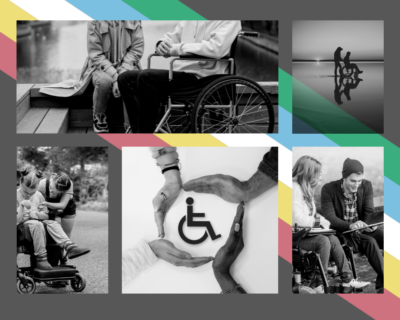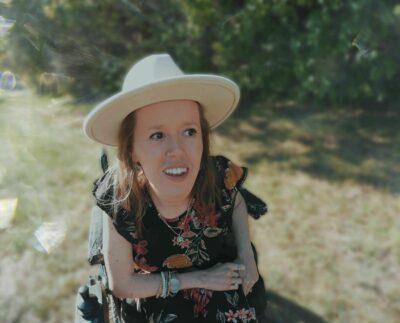Writing and Spirituality - An Interview with Jessica
There are many sides to Jessica including being an author, a disability advocate and Christian. She shares her story with us including the process of writing her book, what she hopes others get out of it and how her religious journey influenced it.
The neuromuscular community has a diverse range of members, enabling us all to learn from many different perspectives and stories. While The Loop is Australian-based, we love connecting with our international community members! In this blog article, we chat with Jessica.
Jessica was born and raised in the Los Angeles County in California, United States, but her parents are from El Salvador which she is very proud of despite not being able to travel out there just yet.
She has Nemaline Myopathy which affects 1 in 50,000 children. This neuromuscular condition affects the skeletal muscles, including the face, neck, pelvis, shoulders, upper arms, and legs. Jessica received this diagnosis in 2019, after finding out that she had been misdiagnosed with Spinal Muscular Atrophy.
Jessica is an author and a disability advocate and shares her story with us!
What is your book about and what inspired you to write it? Was there a particular goal you had for it?
My book A Journey to Freedom VICTORIOUSLY is about my life testimony as a woman with a neuromuscular disease, and I talk about my personal experience being a disabled folk from a medical perspective among other aspects of life. I talk about discrimination in schools, public settings, and so on. I do talk about personal issues that I've had to overcome in my life which I explain more in detail in the book.
The book is directed to the Christian community, but it is also for anyone regardless of their religious beliefs. I discuss topics that are controversial, while I seek to bring people to more faith and change mindsets.
However, the main purpose of this testimony is to expose the disabled community and seek total equality for us in the United States, and globally. My goal is to get the governments’ attention so current laws can be changed for the disabled community.
The inequality that we continue to experience today in society AND in the Christian community is what inspired me to get my story on these pages. We are often overlooked in different areas of life, not just in education or the health care system. It’s way more.
How long did it take you to write the book and what was this process like for you?
It took me one and a half years to write this book. And let me say that the writing process itself was not as difficult as the emotional and spiritual hardships I went through. Remembering my childhood years, did impact me. However, when I started writing about my adolescent years and early adulthood, there were moments where I just didn’t want to continue writing. I did doubt multiple times if I should expose certain topics or not. But for God’s glory, and with His help, I was able to expose my unapologetic story.
You mention that you have had to overcome the misconceptions of others particularly in the education and healthcare system. What has this been like for you and how would you encourage others to find their voice in this situation?
Well, up to this day, it’s very heartbreaking to see the misconceptions that still exist in the 21st century. I’m sure it’s heartbreaking for a lot of us and our loved ones. However, personally, it’s made me very upset more than sad. I feel like we’re still being pushed aside even though Diversity, Equity, and Inclusion (D.E.I) is being implemented in our educational and health care system.
I encourage people who still go through discrimination in both the educational and health care systems, to not keep quiet, especially parents who have nonverbal children. I highly encourage you to advocate for your child. And if someone is a writer, I recommend you to write and publish your book. I’ve learned that writing can be a huge weapon in our favour.
Disability advocacy is obviously a huge part of your life. Why did you decide to go down this path? What are some of the highlights of the work you’ve done?
Since I was very little, I was always told that I should be a disability advocate. I didn’t really understand it back then since obviously I was kid. But when I became an adult, and specifically during the global COVID-19 pandemic, it’s when I found in my inner being that this was my path to take. I saw so much injustice everywhere, which is why I chose to do this. The biggest highlight is this book I believe. However, a lot of work still needs to be done to reach our goal as a community which is full equality.
You mention that eye gaze technology has really helped you in life. How has it helped you and what other pieces of assistive technology have also assisted you/you would recommend to others?
It has helped me greatly to gain a lot of independence not only to navigate the communication device, and the Web, but also to drive my power wheelchair. In case people don’t know, eye gaze can be programmed to drive a power wheelchair if someone absolutely has no use of their limbs. To be honest, aside from my power chair, and vent, the eye gaze has been the only thing that has helped me greatly. And I highly recommend it.
Religion seems to be a big part of your life. Has this always been the case? How has religion helped you get through life? And is it more so the community that comes from religion or God himself?
No, it has not always been the case. I actually struggled with this mainly when my parents became Christians. I did not want to have anything to do with it. However, in 2020, when I saw so much chaos going on around me; and experiencing two losses in the same year, I decided to initiate my own personal relationship with God in Christianity. And yes, it’s helped me very much to get through life. It’s mainly my faith in God Himself that has helped me greatly throughout my past five years. One thing I want to add, many of us can believe or acknowledge the existence of God and Him being our Creator. But it’s a whole different level when one has a personal relationship with Him.
What are your plans and dreams for the future?
Well, I plan to get this book to the right audiences globally, not just governments. I want to spread more and more awareness since I feel it’s part of my purpose here on earth. Let’s talk about my biggest dream since I have so many. It’s to get married to an able-bodied man, and for the disability community to not worry about losing federal assistance just because they found their love. I mean we all deserve equality in everything.
What is one thing that you would tell your younger self?
I would tell myself, “You should have initiated your relationship with God sooner.” I feel like I wasted so much time in not fully believing. I express all of this in the book.
If you are interested in reading Jessica’s book, you can purchase it from Amazon in ebook version, either in English or Spanish. You can also follow Jessica on Instagram and Facebook.
Have advice, 'how to' guides or a story you want to share? We want to hear from you!
You can submit your story or guide via our form. Provided your content meets our content requirements, your post will be published by a Loop moderator to the Living Life section.
Share your story



Join the conversation